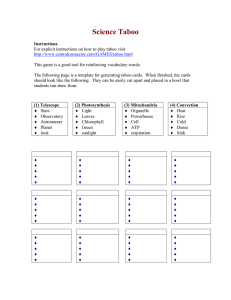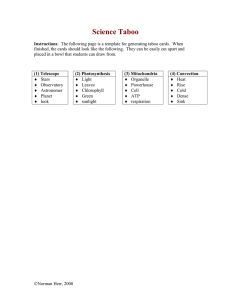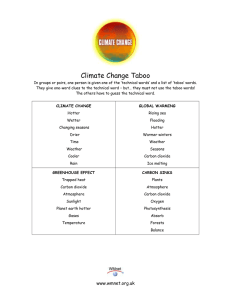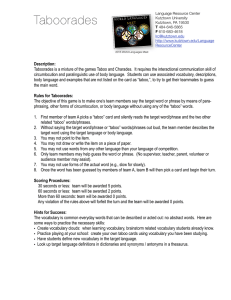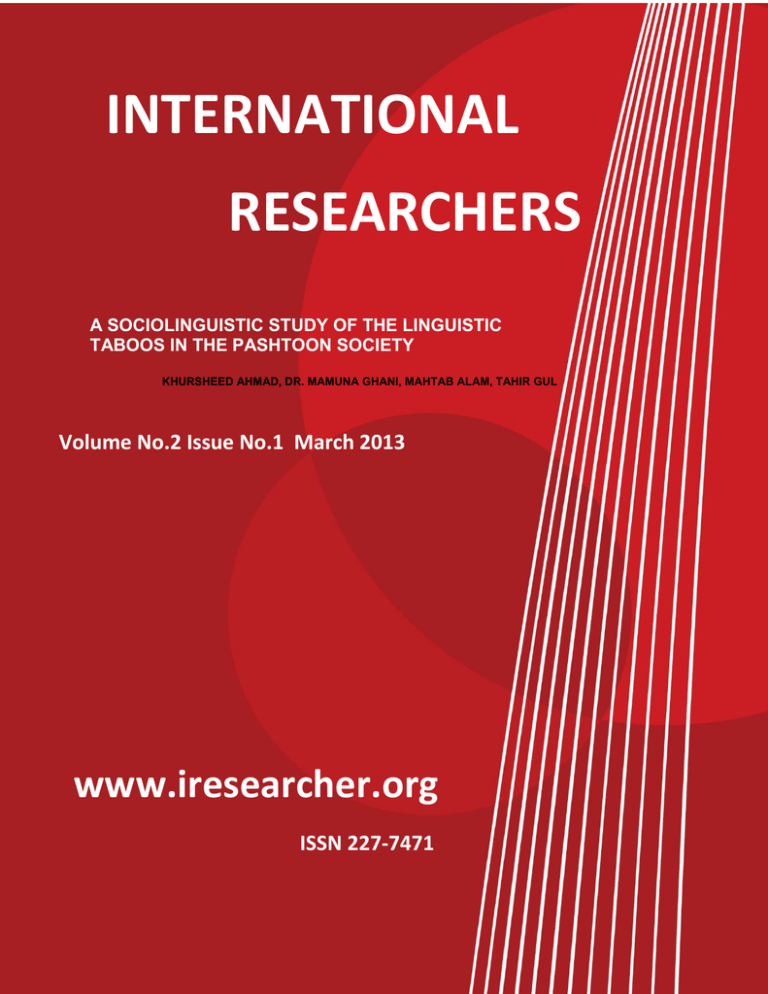
International Researcher Volume No.2 Issue No. 1 March
2013
INTERNATIONAL
INTERNATIONAL
RESEARCHERS
RESEARCHERS
A SOCIOLINGUISTIC STUDY OF THE LINGUISTIC
TABOOS IN THE PASHTOON SOCIETY
KHURSHEED AHMAD, DR. MAMUNA GHANI, MAHTAB ALAM, TAHIR GUL
Volume No.2 Issue No.1 March 2013
www.iresearcher.org
WWW.IRESEARCHER.ORG
ISSN 227-7471
=
34
International Researcher Volume No.2 Issue No. 1 March
2013
THE INTERNATIONAL RESEARCH JOURNAL “INTERNATIONAL RESEACHERS”
www.iresearcher.org
© 2013 (individual papers), the author(s)
© 2013 (selection and editorial matter)
This publication is subject to that author (s ) is (are) responsible for Plagiarism, the accuracy of citations, quotations,
diagrams, tables and maps.
All rights reserved. Apart from fair dealing for the purposes of study, research, criticism or review as permitted under
the applicable copyright legislation, no part of this work may be reproduced by any process without written permission
from the publisher. For permissions and other inquiries, please contact
editor@iresearcher.org
INTERNATIONAL RESEARCHERS is peer-reviewed, supported by rigorous processes of criterion-referenced article
ranking and qualitative commentary, ensuring that only intellectual work of the greatest substance and highest
significance is published.
35
International Researcher Volume No.2 Issue No. 1 March
2013
A SOCIOLINGUISTIC STUDY OF THE LINGUISTIC TABOOS IN THE
PASHTOON SOCIETY
1
2
3
Khursheed Ahmad , Dr. Mamuna Ghani , Mahtab Alam , Tahir Gul
4
1
2,3
Department of English, Lasbella University of Agriculture, Water & Marine Sciences, Uthal Balochistan,
4
Department of English, Islamia University of Bahawalpur, Department of English, Air University Islamabad
(PAKISTAN)
1
2
3
4
Ahmadmalik2007@gmail.com, drghani2009@yahoo.com, mahtab.aalam@yahoo.com, lua_forever@yahoo.com
ABSTRACT
This paper investigates the linguistic taboos in the Pashtoon society in terms of their relationship with the
social context in which they are used and the socio-cultural factors affecting their use. The paper examines and
describes different categories of the linguistic taboos in the Pashtoon society and the strategies used by the Pashto
speakers to avoid the use of these words through different types of replacement of taboo words with more acceptable
words such as using jargon terms, euphemisms, metaphoric expressions, and use of English terms. The paper also
argues that these processes are conditioned by the cultural and religious norms of the society. It also offers an
explanation as to why certain words are considered taboos in the society and why certain taboo words are
accompanied by particular conventionally-fixed words. The taboo words in the Pashtoon society have also been
divided into two categories (general and context-specific) each with subcategories. The paper adopts the „politeness‟
approach proposed by Brown and Levinson (1978, 1987) as the theoretical framework for the analysis of linguistic
taboos in the Pashtoon society.
Keywords: Taboo words, Pashtoon society, Polite expressions, Positive face
1.
INTRODUCTION
Everyone use taboo words every day when and wherever needed though with hesitation and sometimes
with hedges, not in all societies, because of its sensitive nature. The degree of sensitivity varies from culture to
culture and society to society. Taboos, whether social or linguistic, are avoided to be used and study of taboo words
is considered a social taboo. However, it may play a vital role in understanding social and cultural values as well as
psychology of the members of a particular society and culture. The study of taboo words can give a profound insight
into understanding norms, religious and metaphysical beliefs.
2.
WHAT IS A TABOO?
A Taboo is „any prohibitions which carry no penalties beyond the anxiety and embarrassment arising from
th
a breach of strongly entrenched custom‟ (Steiner 1967: 143). The Oxford Advance Learners Dictionary 8
Edition defines taboo as “a cultural or religious custom that does not allow people to do, use or talk about a particular
thing as people find it offensive or embarrassing” I will use the following definition in this paper, used by Qanbar:
A linguistic taboo is any word or a phrase or a topic that if mentioned in public causes embarrassment and feeling of
shame or provokes a sense of shock, and it is offending to the hearer’s sensibilities or his beliefs.
3.
STUDIES ON LINGUISTIC TABOOS
Hongxu et al (1990) conducted a study on taboos in Chinese. They studied how linguistic taboo words are
created and what is their influence on the society. They divided taboos in two categories: macrolinguistic and
microlinguistic. By macrolinguistics they mean all the words which use is prohibited in the society (sex, anti-religion
etc) while microlinguistic means words which are context specific. Their study resulted in various forms of taboo
such as: absolute taboo, a quasi-taboo and non-taboo etc. Following Hongxu et al, Al-Khatib (1995) attempted to
analyze linguistic taboos in Jordanian Arabic. He describes the generation and use of taboos and discussed the
ways to avoid linguistic taboos in Jordanian Arabic. He views Jordanian linguistic taboos to be in complete harmony
36
International Researcher Volume No.2 Issue No. 1 March
2013
with Leech (1964) theory which states that words are subject to a strict set of rules agreed upon by the speech
community members and that shared values concerning their meaning and the reality they signify is a precondition
for communication. Al-Khatib concludes that socio-cultural factors determine the kind of euphemistic replacement
use instead of taboo words. Similarly Mbaya (2002) studied norms and customs in Oromo culture (Ethopia).
According to him, it is prohibited in the culture to mention names of husband, wife or certain in-laws, they look for
and use substations instead most of which are coinages. It is further described that members of the community, as a
sign of respect, don‟t call elders with their actual names but use other decorated words full of beauty and respect.
The study explains the mechanism used for finding substitution. After Al-khatib (1995) and Mbaya(2002), Seifried
(2006) attempted to explore linguistic taboos in American society. He penned down that American society observe a
few categories of verbal taboos such as sex and bodily functions. He also drew a comparison between taboos words
used in past and their modern counterparts in a variety of cultures. He observed further that wide spread coverage
of Clinton‟s affair with Monica Lewinsky in Media has made the American society more liberal and expressive in their
use of taboo words than ever. Now they don‟t try to find euphemisms and love to use the words explicitly. After
reviewing the related literature, it is evident that most of the studies concentrated on linguistic taboos as forbidden
and least spoken part of the social norms and customs of a particular culture and society. The taboos words are
ranked as the “lowest race”, as human are ranked in some societies and religions whom no one will like to talk with
or cultivate any sort of relations. However, none of the studies delved into the reasons causing certain words to be
called as taboo. In fact, there is nothing linguistically inherent in words to make them taboos or not; it is the society
that sentences some words to prohibition and use restriction. The present paper attempts to find the taboo words
and their possible expressions in the Pakhtun society. Taboos will be discussed by dividing them in different
category and sub categories. This paper will also attempt to find the reasons for the tabooed words and expression.
At the end, the paper states various strategies to avoid using taboo expressions in Pashtun society.
4.
THEORETICAL FRAMEWORK
In the attempt to study the linguistic taboos in the Pashtoon society, the researcher found the idea of „face‟
and „The Politeness Theory‟, postulated by Brown and Levinson (1978, 1987), helpful in accounting for the
tabooness of certain words in the Pushtun society.
Brown and Levinson constructed a Model Person (MP), who is a fluent speaker of a language with two
special qualities: rationality and face. By „rationality‟ Brown and Levinson mean that the MP would be able to use a
specific mode of reasoning to choose means that will satisfy his/her ends. By „face‟, Brown and Levinson (1987: 61)
define it as the “public self image that every member wants to claim for himself.” It refers to the social sense of self
that everyone has and expects everyone else to recognize. Face consists of two related aspects: a) negative face:
“the want of every „competent adult member‟ that [their] action be unimpeded by others” (p.62), and b) positive face:
the want of every member that [their] wants be desirable to at least some others” (p. 62).
According to the positive face needs, rational members of the society would continually try to present
themselves in the best shape possible. They strive to keep their faces intact and present themselves worth-respect,
self-sufficient, pure, and free from bad or filthy matters that may damage the integrity of their faces. They need to be
reinforced in their view of themselves as polite, considerate, respectful members of their society. From this
perspective, this image ought to be reflected both physically and linguistically. It will go against the fulfillment of
one‟s positive face needs if one shows in public that he/she answers the nature‟s call or copulates as an instinctive
need, for example. Douglas (1966) thinks that by default we are polite, and euphemistic; and we censor our
language use to eschew tabooed topics in pursuit of well-being for ourselves and for others.
Moreover, as an Islamic society, the Pashtoon society is influenced by the Islamic teachings and values
that place restrictions on using obscene words. On this basis, I attempt in this paper to explore the phenomenon of
the linguistic taboos in the Pashtun society.
37
International Researcher Volume No.2 Issue No. 1 March
2013
Following is the general classification of linguistic taboos in Pashtun society.
I.
CONTEXT SPECIFIC
II.
GENERAL
These general categories and sub categories can be represented with help of the following figure (Qanbar,
2012).
.
Fig. shows categories and sub categories of the Linguistic Taboos in Pashtoon society.
Context specific words are not taboo in itself but its use in a specific context make them taboo. They are further
divided into two categories: non-taboo words and words related to one‟s physical or social disability or defect.
On the other hand General category of taboo words can be further divided into two sub categories:
unmentionable words and words mention with minimizers. Minimizers as called by Qanbar (2011), fixed
conventional expressions used with taboo words.
4.1. CONTEXT-SPECIFIC TABOO WORDS
a-
b-
Non-taboo words: Words which in itself are not taboo but their use in a specific context construct them as
taboo i.e., donkey, owl, dog, pig etc. Folk stories, beliefs and religion has played a vital role in tabooing
these words in certain situations, otherwise they are used quite normally in day to day discourse. In
Pashtoon society, donkey and owl are considered “stupid” while pig and dog are considered impure and
unclean in Islam.
Words denoting physical or social defects: In pashtoon society uttering words like dwarft, bald, divorce,
elopement, professions which are socially considered low before men/women directly related to any of the
above social or physical defects.
4.2. GENERAL
This category can be divided into two subcategories:
a- Unmentionable words
b- Mentionable words with minimizers
The unmentionable words can further be divided into the following subcategories.
1.
2.
3.
Words referring to sexual organs, sexual activity, certain body parts and their functions, undergarments etc.
Words against religion, Allah, Prophet and his companions and Holy Quran.
Names of female members before out siders.
38
International Researcher Volume No.2 Issue No. 1 March
4.
2013
Money, Things donated in charity.
All the above subcategories of taboo words can be found in almost all the cultures of the world though
degree of tabooness varies from culture to culture. From early childhood, kids are trained to avoid using words
related especially to the first two categories deemed as the part of “Language socialization”. However, in
today‟s modern age, the above mentioned categories are hardly considered taboo particularly in West and
America. In pashtoon society one can freely criticize any political figure or event openly even in media and not
strong reaction is expected against him/her from political figures or government official unless personal bias in
involved which is contrary to Qanber (2011) findings about Yammani society where such person is convicted
and punished according to the country law. The third subcategory is strictly observed in Pashtoon society.
Mentioning some one‟s female family member name in public can lead to a bloodshed even. Pashtoons don‟t
mention their female members name in public or before outsider unless genuinely needed i.e. Passport,
National Identity Card or another official registration or in hospitals etc. This is because of pashtoon values as
woman is considered an entity of extreme respect and honor. Secondly because of Islamic values as Islamic
teachings stress parda (cover whole body so that other may not be able to see you face or body parts and or
listen your voice even unless necessary). Woman is consider ghairat or izat (honor) in Pashtoon society and
mentioning their names before an outsider is deemed as attack on the positive face of the family and disgrace
to the family in general and father, brother or husband in particular.
The fourth category, although, is the part of Islamic teachings, however, the practice is pre-Islamic; part of
great Pashtoon values called Pashtoonwali or Pakhtoonwali. It , if disclose before someone, is considered to
bring disgrace to the donor.
4.3. MENTIONABLE WITH MINIMIZERS
This category includes certain words or phrases which are used when accompanied by certain fixed
conventional words or phrases. When someone is compared with a dead one, a phrase zan ghonde sha (May
he be as he is) is used before a name of a dead man or woman. Similarly a ALLAH dy obakhi is uttered
whenever something is talked about a deceased one. The use of such fixed conventional words or phrases is
supposed to mitigate the negative or evil effect of the phenomenon or entity. There are some phrases which are
used to protect or save positive face of the hearer against evil happenings or dirty things. For example ALLAH
mo dy osati (May ALLAH save us), ALLAH dy khair kri (May ALLAH bless you with peace).
Pashtoon society strongly believes in supernatural creatures and evil spirits. German psychologist Wundt
(1927) explains that taboos were originally nothing other than an objectified fear of a "demonic" power which
was believed to lie hidden in a tabooed object. To keep the evil spirit at distance and seek protection against
them, particular minimizers are used. These minimizers are believed to have a magical power to guard against
spirits and supernatural entities. It is believed that that evil spirits can be kept at distance and run away by
setting a stick or wood ablaze and chanting the phrase ka mar shwum ma khoon ta pa ghary (you shall be
responsible for my death). It is strictly prohibited in Pashtoon society to mention genies, spirits and dead bodies
before kids because it can cultivate fear in their minds which can affect them severely.
4.4. EXPRESSION OF ADMIRATION
This category consists of minimizers which are considered to guard against evil eyes to befall on the object
or things which are admired or liked. It may include car, watch, newly built house, dress, physical beauty,
intelligence etc. It is generally believed that there are certain people with evil eyes with great evil power. It they
look at something or someone and admired them, it may cause harm. Hence some fixed phrases or words are
spoken to have protection against the expected evil power and phrase such as Shetan ghwagoona kara osa
(May Satan be deaf) or Pa nazeer masha (May evil be away). It is believed that if such phrases are not uttered,
a praised thing may be damaged or a person may die or face severe troubles.
5.
FACTORS AFFECTING USE OF TABOOS
Whether a taboo should be used and what should be the degree of its acceptance or prohibition, entirely
depends on socio-cultural and religio-cultural factors deep rooted in Pashtoon culture. It has been observed that
frequency of the use of taboos is greater among illiterate people than educated ones. A word or phrase strictly
banned in one group, may be frequently used in other. It means that the degree of tabooness of words varies
from group to group in Pashtoon society. Similarly nature of words also determines the degree of its tabooness.
For example talking about female sexual organ is totally forbidden however talking about male sexual organ
does not fall under this category of strictness. According to Holmes (1992) youngsters love to use more taboo
words than adults or children. Similarly the frequency of use of taboo words is far greater in males than females.
39
International Researcher Volume No.2 Issue No. 1 March
2013
It is because male are exposed to society and their social interaction with different people is frequent than
female.
Another factor is demographic background of the pashtoon people. Interestingly people living is cities use
more taboo words than those living in mountains or villages. Moreover villages close to cities use taboo words
more frequently and than those living far in mountains or in remote areas. This is contrary to Qanbar (2012)
findings about Yemini society where taboos are used more in villages than cities. Surprisingly people in remote
villages and mountains have the opportunities to observe sexual activities between animals and pets but even
this things could not pollute their language in terms of taboo words.
Socio-economic condition has a diverse effect on pashtoon people living in cities and little effect on
villagers or mountainous masses. Poor people striving for living never care to use civilized language or at least
to pay heed to the language of their kids. Due to congested houses and joint family system, children have a
greater opportunity to watch their parents having indulged in sexual intercourse. They could hear their parents
using abusive language. It is then become natural they would use what they have watched and what they have
heard especially when there is no fear of rebuke or punishment.
6.
HOW TO AVOID USING TABOO WORDS
In Pashtoon society there are used various words or phrase to replace the use of taboos, this replacement
does not damage the content of the topic. This is done to “avoid possible loss of face; either one‟s own face or,
through giving offence, that of the audience, or of some third party” (Allan and Burridge, 1991, p.11). To replace
the terms, Pashtoons employ a number of mechanisms such as using jargon terms, constructions,
euphemisms, creating antonyms, metaphoric expressions, and use of standard Pastho terms or even
borrowings from other languages. Some taboo words can be replaced by making use of all or some of the
mechanisms mentioned.
Some of words related to physical defects are changed with metaphorical expressions. For example if
some has broken his leg or permanently damaged, he may be called gul (Rose). Similarly a lunatic person may
be called by an expression of sher or mazary (Lion).
For the body organs and their functions more polite words are used to indicate the function or organ. The
word for faeces ghul is replaced by a word daky matyazy (human waste). The male sexual organ khota (penis)
is replaced by the word shy or tasho matyazo zy, same word is used for female sexual organ. Female period is
expressed by the word bemari (sickness), than mahwari. However educated people prefer to use English words
for the body organ or functions such as shit, penis and pussy etc.
Similarly for sexual intercourse word korwaly or samlastal (sleep) is used than the word ghowan. The first
intercourse between the couple is referred as wada shpa or pela shpa (wedding night or first night).
Words referring to males and females in family depend upon their age and function they play within and
outside the family. The word used for elder sister is baiby rather than calling her by real name. Mother of
children is always called by a phrase mashumano mor (kids‟ mother) or she is called by the eldest son name. If
a female is having any child, a phrase ta la yom (asking you) is used instead. If some is speaking about a
female of other family, her eldest son name is used or the name of her husband is used as X kor wala.
Words related to sacred personnel are not used in isolation, it must precede a fixed phrases. Words like
Khudai (ALLAH) is followed by Pak (clean) and Prophet name is followed by sala allah elieh wa sallam (peace
be upon him), the names or companions of the Prophet are followed by a phrase radhai allah anhu/m (God‟s
grace is on him/ them).
7.
CONCLUSION
This paper not only investigates different kinds of taboos used in Pashtoon society, it also provides an
insight into Pashtoon society and culture as well as norms, customs and belief shared by the members of the
Pashtoon society. There are a number of taboo words share by most of the societies and culture of world,
however certain taboo words are particular to Pashtoon society as well as the degree to which these taboo
expressions are practiced. if taboo words of pakhtoon society are compared with other cultures, it would show a
great deal of similarity with those cultures where Islam is prevailing as a religion, though some taboos are
unique to Pashtoon society giving a distinct identity to this society.
This study is supposed to be an overview of the linguistic taboo in Pashtoon society. A room for discussion
and research is there to delve into this novel area of the Pashto language and culture and come up with more
40
International Researcher Volume No.2 Issue No. 1 March
2013
elaborated and fruitful findings that can be proved a “light house” for those who are interested in Pashto
language
REFERENCES
Al-Khatib, M. (1995). Sociolinguistic View of Linguistic Taboo in Jordanian Arabic. Journal of Multilingual and
Multicultural Development, Vol. 16, No. 6. 443 – 457.
Brown, P., and C.Levinson. (1978). Universals in Language Usage: Politeness Phenomena. Questions and
politeness: Strategies in social Interaction. 56-289. Cambridge University Press.
Brown, P., and C, Levinson.(1987). Politeness: Some Universals in Language Usage. Cambridge: CUP.
Holmes, J. (1992). An Introduction to Sociolinguistics. Longman: London and New York.
Leech, E. (1964). Anthropological aspects of language: Animal Categories and Verbal Abuse. In Eric H.
Lennenberg (ed.) New Directions in the Study of Language (pp. 23-36). Cambridge, M.I.T. Press.
Mbaya, M. (2002). Linguistic Taboo in African Marriage Context: A Study of the Oromo Laguu Nordic. Journal of
African Studies 11(2): 224-235.
Qanbar, N. (2011). A Sociolinguistic Study of The linguistic Taboos in the Yemeni. MJAL.
Seifried, B. (2006). Taboo: Cultural Phenomenon Headed For Extinction? M.A Dissertation, Georgia State
University.
Steiner, F. (1967). Taboo. Penguin books, Harmondsworth, UK.
Wundt, W. (1927). Völkerpsychologie. 4(10). Leipzig, Kröner.
41

